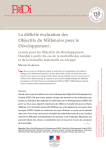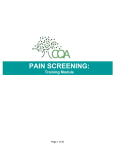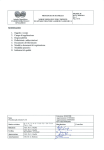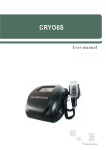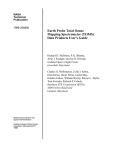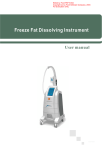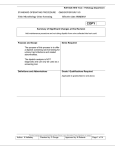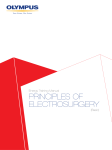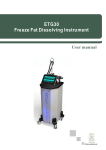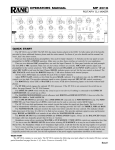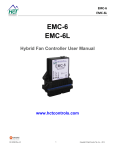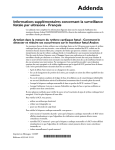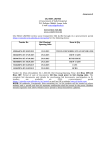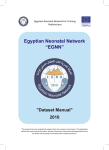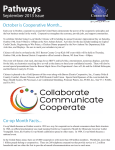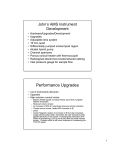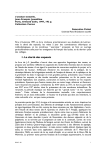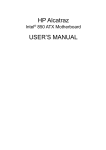Download The MOTHER Initiative USER`S MANUAL
Transcript
The MOTHER Initiative USER’S MANUAL Mobile Obstetric Training & Health Enhancement Resource G l REGIONAL OFFICE FOR l Africa Originated and developed by The Global Library of Women’s Medicine in association with The World Health Organization (African Region) The Mother Initiative is a completely new program that has been developed by The Global Library of Women’s Medicine as a contribution to safer motherhood. The program is being made available entirely free to locations where the appropriate, local medical authorities feel that it can fulfill a useful role. The origination of this program has been undertaken using the resources of The Global Library of Women’s Medicine, together with those of other contributing organizations, and it has been developed in close association with the World Health Organization (African Region) who have provided their expert guidance, experience and insights to assist in focusing it on critical clinical needs. It is intended to continuously adapt and develop the program in the light of practical experience gained from its actual use – and to broaden its scope when time and resources allow. Editor in Chief Dr Luis Gomes Sambo Director for Africa, The World Health Organization Originator and Publisher David G. T. Bloomer President, The Global Library of Women’s Medicine Program Developer Simon Mather Managing Director – AMA Dataset Program Coordinator Paula F. Bloomer Director, The Global Library of Women’s Medicine Special Consultant Dr Sylvia Deganus Obstetrician Gynecologist and Consultant to WHO, Ghana The Global Library of Women’s Medicine is a not-for-profit Foundation dedicated to contributing to the enhancement of women’s healthcare by making available expert, peer-reviewed, clinical guidance to medical professionals worldwide. All its activities are overseen by an International Editorial Board of distinguished leaders in the field under the chairmanship of its Editor-in-Chief: Professor Sir Sabaratnam Arulkumaran President of The international Federation of Gynecology and Obstetrics (FIGO) To contact The Global Library of Women’s Medicine please email: [email protected] www.glowm.com DEFINING THE PROGRAM Introduction The MOTHER Initiative is a completely new and original program that makes use of the latest advances in mobile technology and cloud computing to help midwives save mother’s lives. It is based (principally) on the use of large smartphones that midwives can carry with them at all times and which will enable them to do the following things • Create a detailed health record of every pregnant woman that they examine • Update that record easily throughout pregnancy and early infant life • Identify instantly whenever a woman is overdue for a pre-natal check up • Receive an automatic reminder if a woman fails to attend a pre-natal check up (the woman also receives an automatic reminder) • Access each woman’s health record instantly and at any time ALSO • Have instant access to a wide range of clinical guidance, designed to provide the midwife with on-the-spot help when no other assistance is available • Educate and inform patients on basic health matters with animation and film sequences The Objectives of The MOTHER Initiative Too many women die in childbirth – or suffer unnecessarily from complications arising as a result of it. In many countries with higher than average mortality and morbidity rates there are a range of different reasons for this but two of the most important causes are that: • P regnant women fail to seek proper clinical care, do not attend for antenatal checkups and often undergo childbirth at home with unskilled assistance. • T he people who care for them in childbirth often lack the necessary knowledge to manage unexpected obstetric emergencies successfully. The MOTHER Initiative has been designed specifically to try and address both these problems. And it does so by combining the best current clinical practice with the latest mobile phone and cloud computing technologies. In effect it provides a practical aid to midwives that helps them overcome some of the challenges that many of them are used to encountering in their daily practice. In addition, and as a natural consequence of the way it has been designed, it also provides health administrators with immediate access to a wide range of important health statistics and data that should be valuable to them in monitoring care and planning future improvements. 1 Part 1: EXPLAINING THE PROGRAM What it does Monitoring pregnant women. The first module of the program is focused on monitoring pregnant women – and on trying to ensure that they do actually attend prenatal check-ups. It does this by enabling the midwife to enter data about each new woman patient very simply on her special mobile smartphone. As will be demonstrated later, this is a simple process that can be done conveniently and rapidly. Once she has entered this data the midwife will always have all the relevant information about that woman instantly available at her fingertips. As importantly, the program will automatically remind her when that woman is due for another check-up – what is more, it will also automatically remind the woman herself (assuming that she has a simple black and white, mobile phone, which many now do). Every time the women attends for another check-up her record can be immediately accessed by the midwife and the results of the check-up can be added to her existing health record. In consequence, her full pregnancy record is always available to the midwife who will be able to refer to it in order to plan appropriate treatment strategies wherever necessary. The program also covers the actual period of childbirth and the early post-natal weeks. At every stage the midwife can monitor the mother and maintain a full record of both her progress and that on the newborn infant. The program then continues to keep track of the infant for immunization purposes for 36 weeks to ensure that it receives the appropriate vaccinations and to automatically remind the midwife – and the mother – whenever vaccinations are overdue Supporting the busy midwife. Midwives often work in challenging circumstances, quite frequently without immediate access to the support of an expert physician. At the same time they may be presented with a wide range of obstetric problems and emergencies some of which they may have little experience of handling. The MOTHER Initiative has, therefore, been designed to provide them with instant access to a wide range of learning and revision resources that will reinforce midwives’ previous learning. They are practical, easy-tounderstand. and offer useful, on-the-spot assistance in managing some of the clinical challenges that midwives often face. The resources include special tutorials on key obstetric emergencies (such as pre-eclampsia, sepsis and postpartum hemorrhage), short skills videos (demonstrating the practical management of procedures such as vacuum extraction, shoulder dystocia and neonatal resuscitation), 10 minute clinical films on many childbirth related issues – as well as expert clinical texts and many other resources. 2 In addition there is even a range of short, highly visual, picture animations with voice commentary that midwives can show to their patients to educate them about pregnancy, childbirth and early infant care. Because these animations are highly visual and are accompanied by voice commentaries they can be fully understood even by patients who are unable to read. Finally, this module of The MOTHER Initiative also features a digital pregnancy/birth calculator – which enables the midwife to calculate very rapidly and accurately, the estimated birth date (and other key dates) of any pregnant woman. Enhancing contact. Since The MOTHER Initiative is based around a smartphone (albeit it one with a specially large screen) the program may also be used for rapid contact with other health professionals. The program allows for instant phone and texting to a range of support contacts – and it also allows for emailing more detailed messages when appropriate. Finally, there is also a “Help” facility designed to provide technical support to any individual midwife who encounters operational problems with the use of the device or its program. 3 EXPLAINING THE PROGRAM (continued) How it works The MOTHER Initiative program is based around the smartphone with the largest display screen that is currently available, the Samsung Note. Its screen measures 5.5 inches and it does therefore provide quite a satisfactory platform for viewing medical records, entering new data and clearly viewing video-based resources as well as texts. Of course, it also functions as any normal phone. Before being made available to midwives each smartphone is preloaded with the whole program – it therefore comes entirely ready to use. (Actually, updates to the program and additional information resources can be added to the phone remotely at a later stage if these are required – but that is not likely to be relevant in the initial testing period.) This means that the whole reporting system for patients is immediately available for use – and once connectivity has been established with the appropriate local network provider it can be used at any time. In practical terms it should be noted that the Reporting Module of the program does not need constant connectivity to be usable – it will function perfectly well if connectivity is available as little as 10% of the time; it simply means that data entered will not be updated to the central server until the connectivity is available (at which stage it will happen automatically). < Back PATIENT DETAILS Care Provider Name Number Patient Family Name Given Name Home Address Contact Phone Number Birth Year Date Registered First Day of Last Menstrual Period Due Date Gravidity Parity Previous Medical Risk Complications Miscarriages 0 Abortions 0 Live Births 0 Dead Births 0 Hypertension Yes No Diabetes Yes No HIV Infection Yes No Sickle Cell Disease Yes No Previous Cesarean Section Yes No Other Yes No Notes First Ante-natal Visit (14-18 Weeks) Second Ante-natal Visit (20-24 Weeks) Third Ante-natal Visit (28-32 Weeks) Fourth Ante-natal Visit (36-38 Weeks) Birth Record Day 1 After Birth – Examination of Baby and Mother Day 2 After Birth – Examination of Baby Day 3 After Birth – Examination of Baby Week 1 after Birth – Examination of Mother Week 6 after Birth – Examination of Baby and Mother Week 10 after Birth – Examination of Baby The Reporting Module simply transfers all data that is entered, via the local mobile phone network, to the internet, where a cloud computing program stores it. This program not only analyses all the data but makes it available to the midwife and to the local health authority at any time (the midwife will view it on her smartphone whilst the local health authority can access it via a secure internet link to the cloud-based program). Week 14 after Birth – Examination of Baby Based on the data that it receives, the cloud-based program follows the progress of each woman patient throughout pregnancy, childbirth and the early neonatal period and is programmed to send out reminders both to the midwife and the woman herself whenever an appointment is overdue. The Information Module requires NO connectivity to the local phone network: all the resources that it makes available are pre-loaded onto each phone prior to distribution. These resources are, therefore, “live” on the phone and are instantly available to the midwife anywhere and at anytime. Reporting Information The Contact Module (that enables phoning, texting and also email messaging) does require connectivity via the local phone network to be available in exactly the same way as with any ordinary mobile phone. Contact 4 Cloud computing – the key to patient tracking and data analysis The Central Management System (CMS) for The MOTHER Initiative is hosted on an internet “cloud” and can be accessed remotely by anyone who is provided with the secure access code. The system stores all the data that it receives from each midwife and uses it to calculate when the next appointment is due. As a result it is able to identify when any patient is overdue and to send out an alert to the relevant midwife and an automatic reminder to the patient herself by a text to her mobile phone (if she has one). The CMS is also able to present the data it receives to the local health authority in any format that is required. Thus the local health authority can view the patient records of every midwife and receive a detailed analysis of pregnancy and childbirth statistics for their area covering a very wide range of clinical parameters. These will provide important insights into current health, morbidity and mortality issues that can contribute significantly to future planning and provision. Midwives – action Midwives – reception • Input data • Access instant obstetric educational support • Contact other professionals • Can review data of all their patients • Receive alerts when patients are overdue • Receive updates from local health authority The Cloud-based The MOTHER management program Regional Hospital • Can view details of each individual patient • Can analyze outcomes and review all performance • Can use data analysis to assist in future planning decisions 5 EXPLAINING THE PROGRAM (continued) What is needed To operate The MOTHER Initiative successfully very little infrastructure is required. Principally just two elements must be present: 1. The availability of a mobile phone network that provides connectivity to all the smartphones in the program for at least 10% of the time. 2. The facility for re-charging the smartphones. The Samsung Note has a reasonably longlasting battery but if it is used continuously it may need to be charged once a day – in other circumstances, however, it may last 2–4 days between charge. Of course, to make use of the data anaylsis provided via the cloud computing program the local health authority (or whichever organization or hospital is authorized to access the data) needs to have access to the internet. Since The MOTHER Initiative program is largely self-supporting, no other facilities, equipment or features are required. Other considerations Confidentiality. The medical records of all patients are private and should be confidential, with the data entirely unavailable to unauthorized third parties. With The MOTHER Initiative because each smartphone requires a separate and distinct password before it can be opened the information it holds should be more secure than with traditional paper-based systems which anyone can view. Of course, if the smartphone is stolen or lost it can be blocked remotely as soon as its loss is reported and no access to the phone of any kind then remains possible. In the same way, access to the cloud-based data base is stricly controlled by confidential log-in codes. If the circumstances require it is also possible to encrypt all the data thus making it very difficult or impossible to read even if access to the data was to be achieved. Security. Since smartphones are comparatively small it is always possible that one might be lost – or even stolen. In such circumstances the smartphone in question can be blocked remotely thus making it virtually useless and rendering all the data and other items on it permanently unobtainable by anyone. To reduce any security risk the smartphones are provided in simple belt pouches that are unobtrusive in appearance and which offer a practical way of ensuring that it is always readily available for use. Assessing its clinical value Extensive trials will be undertaken to assess the practical benefits that can be derived fro the use of The MOTHER Initiative. Each trial will be monitored by a local Trial Director and all midwives involved with the program will be invited to attend a special training course to familiarize themselves with both the program and with the smartphones on which it is run. Further support will be provided to them throughout the course of the trials, which are anticipated to run in the first instance for 12–18 months. Outcomes from the trials, and other indicators, will be compared directly with those from matched control areas and the results published. It is hoped that after any recommended modifications have been effected the whole program can be scaled up, in appropriate areas, on a much wider basis. 6 Benefits of using the program It is anticipated that the following benefits should be derived from the use of The MOTHER Initiative • Improved contact between midwives and their patients • M ore detailed clinical records created for each patient, due to the carefully structured record form that automatically presents to the midwife whenever a patient is examined • Enhanced awareness by midwives of patients who are overdue for prenatal care • Improved attendance generally for prenatal examinations • Earlier identification of danger signs during pregnancy • Increased ability of midwives to manage difficult obstetric conditions or emergencies • B etter understanding by patients of the actions that they can take to improve their pregnancy and childbirth • Greater patient compliance with required postnatal immunizations • A vailability of sophisticated and detailed data aiding local health authorities to improve evidence-based provisioning and planning • C loser clinical contact between midwives and their local health authorities and/or hospitals All of which should result in; • Fewer maternal deaths • Less mothers suffering from post-natal complications and disabilities • Healthier infants • Better informed and supported midwives 7 Part 2: HOW TO OPERATE THE PROGRAM This section is designed to provide a step-by-step guide to operating The MOTHER Initiative effectively. 1. Switch on the phone – and then enter your security number 2. The MOTHER Program will start automatically. There will be a brief title screen followed by the first “Menu” screen with 3 choices indicated by these icons. To record the progress of a patient or to register a new one 1. Select the “Reporting Module” by tapping on the first icon. Reporting 2. Then select “Individual Patient Record”. Individual Patient Record 3. If the women being examined is a new patient complete the basic patient information itemized in the first protocol. Tap the black box “Close and Submit” to store this information permanently. 8 4. If the woman being examined is a returning patient attending for a prenatal examination select this icon. Then select her name from the list and open her record. This will now already contain the information required about her that was listed when she was first registered plus the information recorded from any subsequent examination she may have had. Review All Patients 5. Then select the box on the Report Form marked “First Antenatal Visit (14–18 weeks)” (or tap one of the three other boxes below if she is attending for a later examination. The box will then open to reveal all the tests that should be carried out at that examination. Many of these can be completed by simply using the “slider” or selecting the square with the correct information. Occasionally you will have to use the keyboard on the smartphone to fill in a specific item Tip: To make the entries easier, hold the phone horizontally (i.e on its side) so that the Report Form is larger. You can also use the special pencil that is incorporated into the smartphone to tap on individual keys if you find this easier. 6. When you have finished completing the Reporting Form select the black “Close and Submit” box and the data will then be saved - and it will also automatically be sent via the mobile phone network to the central data storage point of the cloud computing program (NB If there should happen to be no phone connectivity at that moment then when connectivity is next established the phone will automatically send the data at that time). 7. Repeat this process whenever the patient returns for another prenatal examination. 9 HOW TO OPERATE THE PROGRAM (continued) 8. After childbirth and during the following 48 hours complete the short Reporting Records that are provided in exactly the same way. 9. Later, complete the Vaccination records in exactly the same way whenever the mother brings the baby back for its vaccination. The patient’s childbirth record is then complete – and all the data will be permanently stored on the central cloud computing program, providing important information for the local health authority and/or the regional hospital. How do you look at all your patient’s records? 1. Select the “Reporting Module” by tapping on the first icon 2. You will then see this screen. 3. Tap the icon “Review all patients” – and a list of all your current patients will appear. Tap any name you wish to review and their records will appear. To close a patient’s record tap the black button marked “Close and Submit” Can two or more midwives view the same patient’s records? Yes. If two (or more) midwives are working together and wish to share patients’ records they can both be issued with smartphones with the SAME log-in code. In this case both the phones records will be identical – and when one midwife enters data on an individual patient that data will automatically appear on the other midwife’s phone (provided that mobile phone connectivity is available). 10 What happens if a patient is overdue for an appointment? 1. Select the “Reporting Module” by tapping on the first icon 2. You will then see a screen with the caption ‘Review All Patients’ If it is flashing on and off this means that a patient is overdue – and one whose record you have not yet viewed. Reporting 3. Tap the icon “Review all patients.” A list of patients will then appear – and any that are overdue will be highlighted. NB The patient will have already been sent an automatic reminder text (if she has a mobile phone) – but you may also wish to remind her yourself by a direct phone call or by other methods 4. Tap the relevant patient’s name to view their current record. Review All Patients To access the clinical support resources 1. Select the icon marked “Information” 2. You will then see an extensive list of resources. Select the resource that you would like to view. (NB Many of the videos have a sound commentary. This is quite audible in a quiet room but may be better heard using earphones in noisy surroundings). Information To use the smartphone to contact other medical professionals 1. Select the icon marked “Contact” 2. Decide whether you want to phone or text, and select accordingly Contact 11 PART 3 THE INFORMATION MODULE A guide to the support resources available on the smartphone 1. To access the wide range of practical information that is available on The MOTHER Initiative smartphone tap the icon marked “Information” You will then have instant access to a whole range of useful resources. (NB No connectivity is ever required in order to be able to view these – they have all been pre-loaded onto the smartphone and are, therefore, always available any time and anywhere) Information The resources that are available will be listed as follows: What these resources feature 1. Pregnancy calculator An easy-to-use digital calculator for instantly calculating the correct childbirth due date – and other significance dates 2. Tutorials A series of 7 short, visual presentations designed to reinforce midwives’ previously-learnt knowledge about basic obstetric care procedures The SAfer MoTherhood K n o w l e d g e Tr a n s f e r P r o g r a m Editor-in-Chief: Professor Sir Sabaratnam Arulkumaran 3. Visual Guides A series of 6 highly illustrated sequences summarizing essential guidance for practical clinical management The Active Management of the Third Stage of Labor G www.glowm.com 12 2 ial tor tive Tu r Initia Mothe or: al lab Norm t stage rs The fi er t Fish Margaressor in Midwifery ives, Profe ge of Midw Associate Royal Colle and The University United Kingdom ld, – and shou training by itself previous guidance re-inforce sufficient ned to red as is desig ial rega This tutor fore, not be there Plymouth e: The se any orde signs may happen r in 1 3 Anatom Blade ted Va sis To As Cephalic curve livery ps De Force cedures Pro ide An Gu y of th e forc eps Toe Delivery ginal Heel Shan ks overlapping parallel Lock Toe Fenestrati on Finger guide Wright Lee Lecturer Midwives, ge of Midwifery l Colle The Roya y and dom Universit United King Plymouth ld, – and shou training itself previous nce by re-inforce ient guida ned to as suffic ial is desig be regared tutor not This therefore, Pelvic curve Handle Blade 1 Heel Shank Lock Handle 3 For more detailed information, see text on the reverse side of this leaflet Uterotonic Administer a uterotonic (oxytocin or misoprostol) within 1 minute after the baby’s birth and after ruling out the presence of another baby (the uterotonic of choice is oxytocin 10 IU IM). THE GLOBAL LIBRARY OF WOMEN’S MEDICINE 4. Skills videos A series of 5 short (3 – 4 minute) expert videos, with voice commentary, demonstrating in an impressively clear style how to undertake basic birth=related procedures STeP How mi ght yo u kn is in labow the wo man or? She may mucus have a ‘show from the ’ (a plug may hap vagina) of pen sev – she star eral day but this ts labo s before r She may rupture feel her memb (waters ranes break). She ma around the bab having y, or ma y contrac y not, be tions of She the ute may rus painful, begin to feel reg rhy of the ute thmical con ular, trac relaxes rus (womb tigh tions ) tens and Not Give 600 µg of misoprostol by mouth within 1 minute after the baby’s birth and after ruling out the presence of another baby. Give 600 µg of misoprostol by mouth within 1 minute after the baby’s birth and after ruling out the presence of another baby. STeP 4 For more detailed information, see text on the reverse side of this leaflet Controlled Cord Traction (I) Perform controlled cord traction (CCT): (i) Place the clamp near the woman’s perineum to make CCT easier. Hold the cord close to the perineum using a clamp. Place the palm of the other hand on the lower abdomen just above the woman’s pubic bone to assess for uterine contractions. If a clamp is not available, CCT can be applied by encircling the cord around the hand. Encourage maternal effort to bear down with contractions. If necessary, help the woman into an upright position to assist with delivery of the placenta. NOTE: controlled cord traction should ONLY be performed when a skilled attendant is present at the birth. Perform controlled cord traction while, at the same time, supporting the uterus by applying external pressure on the uterus in an upward direction towards the woman’s head. 5. Educational Films A selection of 11 very well designed educational films (average running time about 10 minutes) providing important insights into the management of many pregnancy and birthrelated issues 6. Community Education Animations A series of 14 short animations (each about 3 minutes in duration), with voice commentary, providing simple visual guidance to women about pregnancy, childbirth and newborn care – for displaying to patients 7. Textbooks – for immediate references 3 useful textbooks providing comprehensive coverage of the most important aspects of pregnancy and childbirth, that can be easily searched and referred to for detailed and reliable on-the-spot guidance G www.glowm.com The MOTHER Initiative < Back PATIENT DETAILS Care Provider Name Number Patient Family Name Reporting Given Name Home Address Mobile Obstetric Training & Health Enhancement Resource Contact Phone Number Birth Year Date Registered First Day of Last Menstrual Period Due Date Gravidity Parity Previous Medical Risk Complications Review All Patients Miscarriages 0 Abortions 0 Live Births 0 Dead Births 0 Hypertension Yes No Diabetes Yes No HIV Infection Yes No Sickle Cell Disease Yes No Previous Cesarean Section Yes No Other Yes No Information Notes First Ante-natal Visit (14-18 Weeks) Second Ante-natal Visit (20-24 Weeks) Third Ante-natal Visit (28-32 Weeks) Fourth Ante-natal Visit (36-38 Weeks) Birth Record Day 1 After Birth – Examination of Baby and Mother Day 2 After Birth – Examination of Baby Day 3 After Birth – Examination of Baby Week 1 after Birth – Examination of Mother Week 6 after Birth – Examination of Baby and Mother Week 10 after Birth – Examination of Baby Individual Patient Record G Week 14 after Birth – Examination of Baby Contact l REGIONAL OFFICE FOR l Africa Originated and developed by The Global Library of Women’s Medicine in association with The World Health Organization (African Region)
















